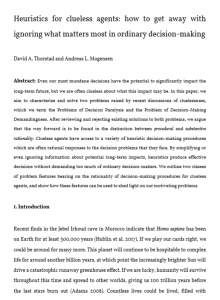Heuristics for clueless agents: how to get away with ignoring what matters most in ordinary decision-making
David Thorstad and Andreas Mogensen (Global Priorities Institute, Oxford University)
GPI Working Paper No. 2-2020
Even our most mundane decisions have the potential to significantly impact the long-term future, but we are often clueless about what this impact may be. In this paper, we aim to characterize and solve two problems raised by recent discussions of cluelessness, which we term the Problems of Decision Paralysis and the Problem of Decision-Making Demandingness. After reviewing and rejecting existing solutions to both problems, we argue that the way forward is to be found in the distinction between procedural and substantive rationality. Clueless agents have access to a variety of heuristic decision-making procedures which are often rational responses to the decision problems that they face. By simplifying or even ignoring information about potential long-term impacts, heuristics produce effective decisions without demanding too much of ordinary decision-makers. We outline two classes of problem features bearing on the rationality of decision-making procedures for clueless agents, and show how these features can be used to shed light on our motivating problems.
Other working papers
Is In-kind Kinder than Cash? The Impact of Money vs Food Aid on Social Emotions and Aid Take-up – Samantha Kassirer, Ata Jami, & Maryam Kouchaki (Northwestern University)
There has been widespread endorsement from the academic and philanthropic communities on the new model of giving cash to those in need. Yet the recipient’s perspective has mostly been ignored. The present research explores how food-insecure individuals feel and respond when offered either monetary or food aid from a charity. Our results reveal that individuals are less likely to accept money than food aid from charity because receiving money feels relatively more shameful and relatively less socially positive. Since many…
Shutdownable Agents through POST-Agency – Elliott Thornley (Global Priorities Institute, University of Oxford)
Many fear that future artificial agents will resist shutdown. I present an idea – the POST-Agents Proposal – for ensuring that doesn’t happen. I propose that we train agents to satisfy Preferences Only Between Same-Length Trajectories (POST). I then prove that POST – together with other conditions – implies Neutrality+: the agent maximizes expected utility, ignoring the probability distribution over trajectory-lengths. I argue that Neutrality+ keeps agents shutdownable and allows them to be useful.
In search of a biological crux for AI consciousness – Bradford Saad (Global Priorities Institute, University of Oxford)
Whether AI systems could be conscious is often thought to turn on whether consciousness is closely linked to biology. The rough thought is that if consciousness is closely linked to biology, then AI consciousness is impossible, and if consciousness is not closely linked to biology, then AI consciousness is possible—or, at any rate, it’s more likely to be possible. A clearer specification of the kind of link between consciousness and biology that is crucial for the possibility of AI consciousness would help organize inquiry into…

